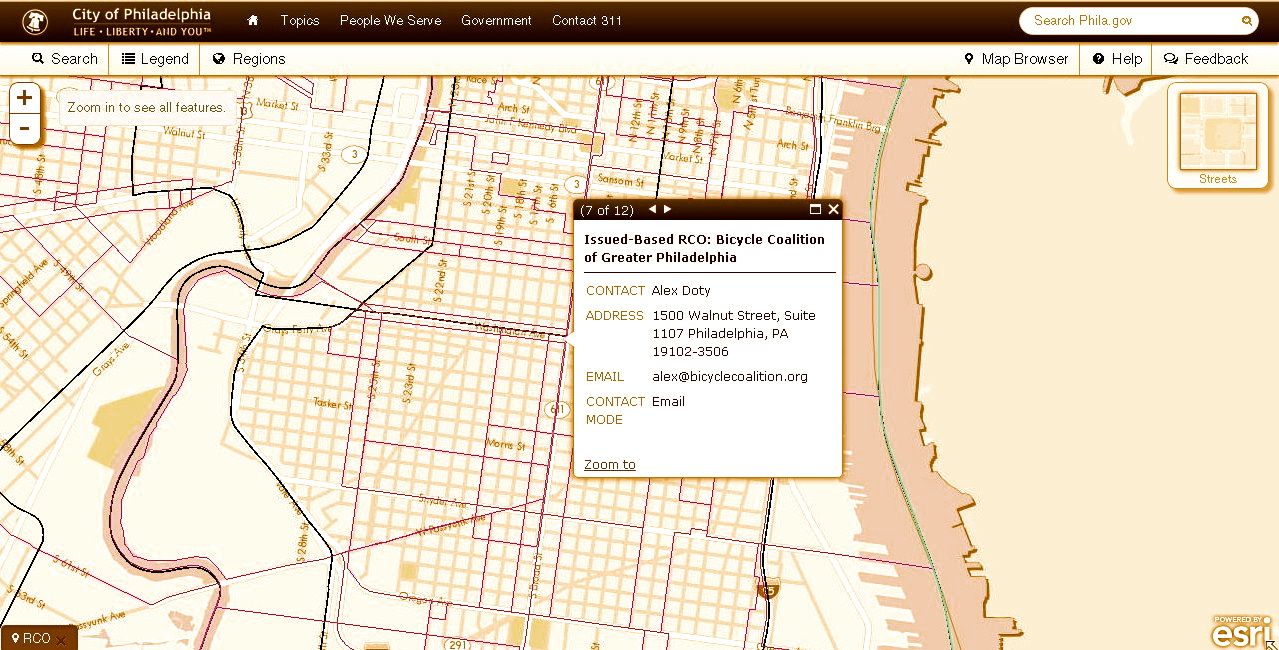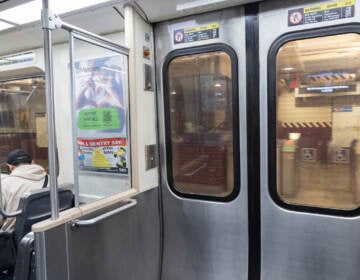Issue-based groups will fight to retain RCO status

Oct. 14 UPDATE: The Central Delaware Advocacy Group has sent a letter to Deputy Mayor Alan Greenberger, Councilman Bobby Henon and all of the RCO bill’s co-sponsers, urging changes that would keep both issue-based and local RCO categories. The letter says that while CDAG supports many of the bill’s proposed changes to the RCO rules, the proposal would “shut out groups with legitimate interests in the development process” by excluding RCOs whose boundaries are greater than 3.5 square miles, and would “undermine the neighborhood groups originally intended to be local RCOs” by granting groups like CDAG – who are issues-based, but have a geographical interest that meets the proposed size – equal footing with civic organiations. Read the letter here.
Some issue-based advocacy groups will lobby for changes to a bill that would remove them from the city’s list of Registered Community Organizations.
RCOs are granted special status by the Philadelphia City Planning Commission; developers must notify them when a project requires relief from the zoning board or will go before the planning commission’s Civic Design Review committee – conditions that most proposals of significant size or complexity meet.
Currently, there are two RCO categories: Local and issue-based. Locals make up the majority of RCOs, and are predominately civic associations, such as the Passyunk Square Civic Association and the Powelton Village Civic Association. Issue-based RCOs focus their work on a particular topic, often across a much wider area, or city-wide. These include the National Association of Minority Contractors and the Bicycle Coalition of Greater Philadelphia.
Under proposed legislation introduced by Councilman Bobby Henon and drafted jointly by Henon and the planning commission, the two categories would be replaced by one – Registered Community Organization, with no modifier. The bill does not specifically ban issue-based RCOs, but it says no RCO may have boundaries of more than 3.5 square miles. Currently, local RCOs can have boundaries up to 7 square miles, and there is no size limit on the issue-based variety.
Under the proposal, an RCO must also have a statement of purpose that includes zoning, land use or similar topic; conduct open meetings on a regular basis; publicly announce those meetings; and have leadership chosen by the “body at large.”
“The strict language about who would qualify as an RCO goes a bit too far,” said Philadelphia Association of Community Development Corporations Policy Director Beth McConnell. “We don’t think anything is really to be gained from removing people from the notification process.”
“What we’re hoping to do is persuade the people considering the legislation that this is not a good idea,” said Charles Sweedler, general council for Scenic Philadelphia.
“I don’t like the idea of limiting issue-based groups to 3.5 miles,” said Central Delaware Advocacy Group member Dianne Mayer at Thursday’s meeting. “If you have an organization like PHS (Pennsylvania Horticultural Society) or SCRUB (the former name of Scenic Philadelphia) … its concerns are city-wide.”
When asked why it would be beneficial to eliminate the two separate RCO categories, Deputy Chief of Staff in the office of the Deputy Mayor for Economic Development Natalie Shieh said it eliminated redundancy. “Under the current law, zoning applicants are required to send notice to, but not meet with, issue-based groups,” she said in an email. “This notice is redundant with the public orange poster notification system and the publicly-available web ZBA calendar.”
Shieh, whose boss also chairs the planning commission, worked extensively on the city’s new zoning code, including the RCO provisions, in her last position. The PCPC is expected to consider a recommendation on Henon’s bill at its meeting next Tuesday.
Is change a possibility?
“Planning understands there may be further amendments and Planning is open to changes that balance the needs of all zoning stakeholders,” Shieh said.
McConnell, of the Philadelphia Association of CDCs, met with members Wednesday to talk about the RCO legislation.
Some are concerned about the 3.5 acre maximum. Shieh confirmed that even some civic groups have boundaries that are bigger than that. It’s her understanding that there is discussion about that specific number, but she did not know if the discussion included eliminating a maximum size.
Some of the CDCs are more concerned about other new RCO requirements, McConnell said. The bill removes the requirement that RCOs submit notes of their meetings with developers after the meeting, she said, but requires a once-a-year submission of minutes and documents. This will be burdensome for some small organizations, especially those that are all volunteer, and particularly if there is a change in leadership, she said. The penalty for non-complying, loss of RCO status for a year, also seems very high, she said.
When asked about the currently proposed changes after Thursday’s City Council meeting, Henon said the bill is an attempt to streamline a burdensome system.
“What we’re clearly trying to do is define the territory and the parameters and the jurisdiction of the RCOs, period. Where they have jurisdiction, where they have standing, where they have the immediate impact, or whether they’re aggrieved or not aggrieved to the particular land use,” he said. “That’s all.”
Several of the groups that expressed concerns about the loss of the issues-only RCOs said that many of the other provisions of Henon’s bill are needed and improve the RCO system.
“In general, we think the current process is not working effectively,” McConnell said. Her organizations sometimes are focused on community needs and aesthetics, and sometimes are developers themselves. Her group loves that they no longer have to provide public notice by posting fliers. In most cases, she thinks it makes sense for any overlapping RCOs to work out logistics and hold a single meeting with a developer. The new legislation requires RCOs to register annually, instead of every three years. McConnell said that is reasonable, provided the renewals are a simple, easy process.
CDAG Chairman Matt Ruben said the intent of the bill is good, and many of its provisions are essentially rolling the RCO language back to what it was before council passed legislation proposed by Councilwoman Jannie Blackwell earlier this year. In its one-year report released in August, the Planning Commission and other city agencies pointed to several problems created by the amended language. Henon’s bill addresses most of the concerns outlined in that report.
CDAG focuses on the Central Delaware Waterfront, and because that area is less than 3.5 square miles, it would not lose its RCO status should the legislation pass as-is, Ruben said.
But CDAG still opposes losing the separate issue-based category. For one thing, members noted, some of the organizations represented on the CDAG board, including PHS and Mayer’s organization, Neighbors Allied for the Best Riverfront, are issue-based. CDAG members think these groups should continue to receive notice of applicable projects.
CDAG is also concerned that there would be no clear separation in roles between CDAG or another issue-based organization that fits within 3.5 square miles and a civic organization, such as a ward, Ruben said. “CDAG does not want any claim of co-equal status to a local civic,” he said. “It’s unclear whether a civic would be able to assert its primacy as the representative for public input on a particular project.”
CDAG member and attorney Jim Moss noted that CDAG doesn’t want the obligations of a local civic, either. Ruben agreed. Sometimes, developers with projects on the waterfront speak at CDAG meetings, and Ruben wondered if under the new proposal, someone couldn’t say after the fact that that meeting should have been advertised. “Could that mean we lose our RCO status? I don’t know what it means. No one knows what it means.”
Scenic Philadelphia fights against urban blight, and often fights billboards.
The notices of proposed zoning changes are invaluable, Sweedler said. “It enables us to know where the proposed signs are,” he said. Prior to the creation of the RCO system, his organization was dependent on neighborhood residents to “be our eyes and ears,” Sweedler said. But it sometimes took residents some time to find out what was happening, or to let the organization know, Sweedler said. And some residents don’t know about Scenic Philadelphia.
But some issue-based organizations who oppose the change admit they can’t review all the notices.
“We’re a fairly well-staffed organization, and we don’t have the capacity to review every one that comes up,” said Bicycle Coalition of Greater Philadelphia Executive Director Alex Doty.
Preservation Alliance for Greater Philadelphia Director of Advocacy Ben Leech says he gets about five notices per day, on average. Since Philadelphia lacks a city-wide inventory of protected and potentially historically important properties, he looks each one up on Google Street View, and puts those that are potentially concerning into a folder so he can do more digging when he has time. Usually, a media outlet writes about the project before then, and he gets much more information. “So, from a practical standpoint, it’s somewhat redundant,” Leech said.
Yet, Leech said, there may be a time when the media misses something, or a proposal would so impact a historic resource that he does research immediately.
And both Leech and Doty said there are reasons beyond the notice they want to remain an RCO.
It gives the Coalition “a recognized role in commenting on significant projects,” Doty said. “Commenting becomes easier when you have that defined role.”
Leech said that definition may help persuade developers to meet with the Preservation Alliance and work out solutions that preserve history.
You don’t have to be part of an RCO to comment before the ZBA or planning commission, and just like before RCOs existed, commenting gives standing to appeal a decision.
But Sweedler said in the case of an appeal, losing RCO status could cost Scenic Philadelphia and other issue-based organizations a lot of money.
Before RCOs, anyone involved in a ZBA appeal to the court of common pleas was entitled to free copies of the zoning board transcript. Now, they are free only to RCOs.
Shieh confirmed that if Henon’s bill passes, appellants who are not RCOs would have to pay for transcripts.
Based on work Sweedler has done in private practice, they “frequently run in the area of $40 per page,” he said.
-This article includes reporting by Jared Brey.
WHYY is your source for fact-based, in-depth journalism and information. As a nonprofit organization, we rely on financial support from readers like you. Please give today.






